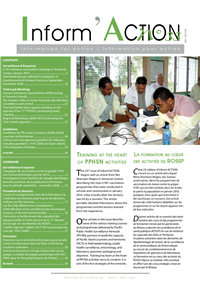Contents
Surveillance & Response
- H1N1 influenza vaccination campaign in American Samoa, January 2010
Sharmain Mageo [116 KB] - Diarrhoeal disease outbreak investigation in Guadalcanal and Honiara Provinces, September – November 2008
Nemia Bainivalu [1.1 MB]
Training & Meetings
- Success and lessons learned from DDM training in Solomon Islands
Narendra Singh [95 KB] - Fiji sharpens skills on vector mosquito identification, surveillance and control [95 KB]
- Training/EpiNet team capacity building on the agenda of the 17th PPHSN Coordinating Body meeting [86 KB]
- Regional Workshop LabNet 2010 promoting the ‘One Health’ approach
Salanieta Elbourne Duituturaga [99 KB]
Guidelines
- Guidelines for TB contact tracing in Pacific Island countries and territories
Kerri Viney, Janet O’Connor, Axel Wiegandt and Richard Stapledon [87 KB] - Clinical case management guideline for influenza, including pandemic H1N1 2009, for Outer Islands of the Republic of Kiribati
Seini Kupu in consultation with the Medical Assistants and Principal Nursing Officers of Kiribati Ministry of Health and Medical Services Link to document online
In Brief
- New SPC staff and useful links [59 KB]
Supplement
- Post-pandemic H1N1 2009 message Pacific Regional Influenza Pandemic Preparedness Project (PRIPPP)
Seini Kupu in consultation with the PRIPPP Team and WHO Suva Office [1.4 MB]
Editorial
Training at the heart of PPHSN activities
This 33rd issue of Inform’ACTION begins with an article from Mrs Sharmain Mageo in American Samoa describing the mass H1N1 vaccination programmes that were conducted in schools and communities in January 2010, a few months after the territory was hit by a tsunami. The article provides detailed information about the programmes and the lessons learned from this experience.
Other articles in this issue describe some of the various training courses and programmes delivered by Pacific Public Health Surveillance Network (PPHSN) partners to build the capacity of Pacific Island countries and territories (PICTs) in field epidemiology, public health surveillance, entomology, and laboratory specimen packaging and shipment. Training has been at the heart of PPHSN activities since its creation. It is one of the five strategies of the network.
An article by Dr Narendra Singh from the Secretariat of the Pacific Community (SPC) details the success of and lessons learned from a field epidemiology or Data for Decision Making (DDM) training undertaken in 2008–2009 in Solomon Islands by SPC in collaboration with other PPHSN partners. An outcome of this training is an article by a Dr Nemia Bainivalu in Solomon Islands, who shares with us his experience of the investigation of an outbreak of diarrhoeal disease that occurred in Guadalcanal Province in 2008.
Field epidemiology training was again one the key issues discussed at the last PPHSN Coordinating Body (CB) meeting that took place in November 2010. The CB members formed a technical working group which was tasked with reviewing current field epidemiology courses delivered by PPHSN partners
(e.g. the Fiji School of Medicine, WHO and SPC) and exploring the possibilities of obtaining sustainable funding.
The establishment of a Regional EpiNet Team (RET) was among the other key issues discussed at that meeting and the CB members agreed that the RET should have a specific focus on training.
A brief description of an entomology training course in vector mosquito identification, surveillance and response, organised in Fiji Islands in September 2010, is also presented in this issue. This was the fourth course of this type organised in the region by PPHSN partners (SPC and the Pasteur Institute of New Caledonia).
A training session on the packaging and shipment of laboratory human and animal health specimens was delivered by Ms Vasiti Uluiviti of the Pacific Islands Health Officers Association to participants of the regional LabNet workshop organised in November 2010. This workshop brought together human and animal health lab technicians from most PICTs and promoted the One Health approach.
Finally, the bulletin includes an article on guidelines for tuberculosis contact tracing in PICTs and information about two SPC staff who recently joined our Surveillance and Operational Research Team.
As a supplement to this issue, we present a post-pandemic H1N1 2009 message by Dr Seini Kupu from SPC in consultation with her colleagues working on the Pacific Regional Influenza Pandemic Preparedness Project and the World Health Organization’s Suva Office. The message includes information shared by and with PICTs during the period of the pandemic up to the post-pandemic period, as well as a discussion of key issues, lessons learnt and recommendations regarding the way forward (both at regional and national levels).
Enjoy your reading and do not hesitate to send us comments on the contents and the new colourful format of Inform’ACTION.
Christelle Lepers
on behalf of the editorial team

